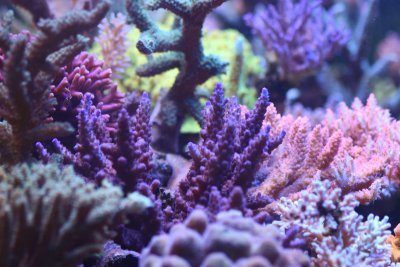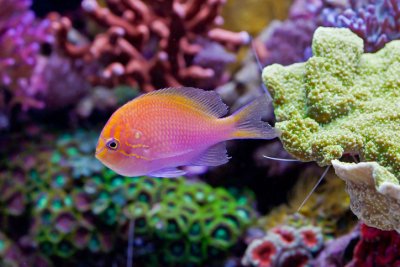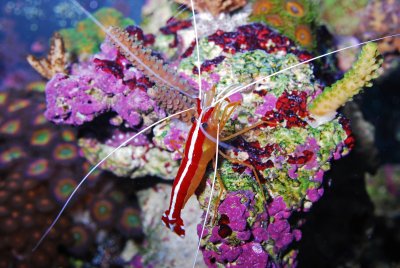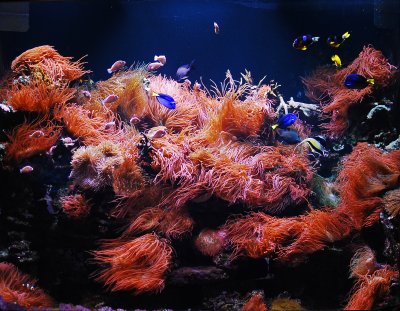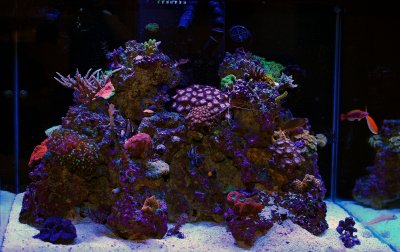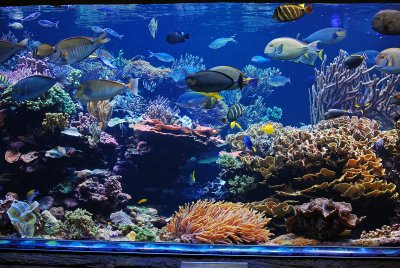All images provided via copyright free image services.
Most are disappointed by my reply. There is no silver bullet and being a successful aquarist requires critical thinking and patience. I’ve concluded that being taken advantage of is common within our hobby. People love the easy way out. The thought that adding a reactor, or a few drops of something can create an instant reef seems like the perfect notion. Yet, hundreds (if not thousands) of dollars later, still no success.
As we enter 2017, many people may wonder what reef keeping resolution could bring about real success. I believe, if you want to be a good aquarist and keep a thriving, growing tank, you need to think like a scientist. Instead of holding onto any specific ideology about reef keeping, take an empirical stance and let facts and evidence form your opinions and thus your methodology. In reef keeping, there are millions of ways to reach the summit and millions of ways to flush money down the drain and experience no change whatsoever.
Assigning blame:
Forums are littered with messages from consumers who feel like they’ve been duped. Forums are also littered with argumentative threads where someone claiming a revolutionary new reef keeping tool has been asked to prove it. Often, they are defending a pre-conceived notion about reef keeping and not offering a hint of evidence or fact. What we think we see, isn’t always what we see. Usually, someone assigns blame to an individual or company that has marketed a product that doesn’t work. Lots of products have fallen into this category over the years. Aquarists feel like they were lied too and thus, they are angry.
However, we are fed numerous quantities of pseudoscience and misinformation daily. The international rise of fake news has brought about a period of increased public ignorance. On the national level, outlets like Facebook and Twitter are being blamed, for not filtering through the newsreel before it goes live. In the world of reef aquaria; forums, bloggers and private companies are blamed when something doesn’t perform as advertised. Still, advertising is a cornerstone of our capitalist free market and remains legal. Yet, it’s not the fault of any outlet that someone can’t tell reality from fiction or that they don’t implement critical thinking well enough to determine on their own if something is worth trying. The example of Discovery Channel’s “mermaid documentary” comes to mind, where millions were duped into thinking NOAA was hiding evidence of real mermaids existence. Critical thinking is an innate human trait and is one of the reasons human beings dominate the planet with such vigor. We can inspect, form a theory and then devise a way to test it.
Take some cues from science:
I could easily argue that science has brought about more revolutions in quality of life than any other field. Thus, science is used everywhere, from medicine to politics to advertising. Science is less rocket ships and bullet trains (which are products of science) and more a method of thought and analysis. Scientific thinking takes nothing for granted and it stares at something with a blank slate. This means looking at a reef product, methodology or additive and not seeing the claims on the package. Instead of seeing images of thriving reefs or colorful letters claiming the sun, moon and stars; look more for the ingredients (now a fair argument against reef products not sharing their ingredients can be made, but that’s for another post). Look at every reef keeping product as if it doesn’t have a single claim, it promises nothing. Then, determine a way to test it and form your own conclusion.
A simple experiment can be conducted if someone has more than one aquarium. If an additive peaks your interest, don’t grab it and begin dumping it into both tanks. For example, if some additive promises increased coloration or growth, first find one or two test coral species. If you need too, frag a colony or two so the same coral is growing in both tanks. Just start using the additive in one tank and monitor the results. Do the specific test colonies show an increase in growth? Is their coloration better? Taking some cues from science you can form your governing theory. If no change was detected, then you can theorize that until you have further evidence, the additive is ineffective. If you find a major increase in growth and coloration on the tank the additive was used on, then you can theorize that until you have more information the additive was effective.
A test tank:
For years now, I’ve run a small test tank simply for testing methodologies and products. I populate the test tank with fragments of coral living in my display. It also has a small population of fish. If I am curious about an additive, I begin using it solely on the test tank. Since the test tank is small, I can use less of the additive and ensure that if it doesn’t perform, I won’t be caught buying a second bottle. While there is, a cost associated with running a test tank, when you factor in the money that might be wasted on ineffective additives, it’s possible to break even.
In the case of methodologies, it can be a real undertaking to convert a large reef tank to a new method of care. Often this is expensive and in some cases, does more harm than good. It’s much simpler to experiment with a new methodology on a small tank, monitor the changes you witness and make evidence based decisions about how to proceed with the display.
Don’t be shocked by what you find. Several years ago, I began running a test tank and putting additives through their paces, before implementing them wide-scale on my display tank. Overall, I found that nearly half of additives on the market had no measurable effect on the health of my corals, fish or tank’s water quality. That means you could browse online, or stand in a shop and remove almost half the additives from the page or shelf and still possibly stumble on something that will do little to nothing. At first it was disconcerting, but it underscores the need for rigorous testing to be a successful aquarist.
Prepare for blowback:
If you’re a vocal aquarist like myself and spend time sharing your thoughts online, don’t be surprised if you get blowback when announcing the results of your tests. This isn’t what every vendor wants to see. Many products are built around the idea that reef keepers are so hungry for success, they will try anything and even a placebo effect will keep them coming back for more. This doesn’t just exist in the market around aquaria. Homeopathic remedies and pseudoscience have entered the human health care market, animal care market and even home health. I know many people who rely on a host of vitamins and supplements that have been debunked by third party, private research labs. Still, the placebo effect is strong and if someone thinks something is working, they can be stubborn about abandoning it, even in the face of cold, hard facts.
Any time a blog of mine has questioned the effectiveness of a product and provided results of personal experiments, I always find myself amid some blowback. Vendors and product manufacturers want to argue the merits of their products and that is understandable, but I’ve found that to both be a successful aquarist and offer real world aquatic advice, it’s best to rely on results that you directly see yourself, in one form or another.
Trim the fat and trust yourself:
The reef aquarium world is littered with product reviews and testimonials that claim to shed light on the effectiveness of new methodologies. While I don’t discourage aquarists from seeking that information out, I highly recommend that they form their own opinions, based on their own testing. It’s quite possible that third-party reviews are created under collaboration with various vendors or product makers and the results are being manipulated to create a visage of success. There are so many accurate testing tools (from PAR meters to Triton Water Testing) available to aquarists, it’s very easy for us to set-up a miniature lab capable of producing real, measurable theories.
An example of reviewers working with product manufacturers took place during the launch of the original Xbox 360. A popular game review outlet had been paid in advance by a developer to praise a buggy, dysfunctional launch game. The review outlet gave it a near perfect score, even praising the fact that the game offered no ability to save. Per the reviewer, the lack of a save feature simply increased the game’s challenge and was positive, as the game was short overall. Once gamers began discussing the title, they quickly learned that it was full of major bugs and not worth anywhere near the 60-dollar price of admission. The façade fell apart and it caused real issues for the integrity of the game review outlet.
Questionable third-party conflicts of interest run both way in reef aquaria. Sometimes a reviewer is trying to prove an effective product is flawed and sometimes they are trying to prove a flawed product is effective. In the end, it’s best to do your own tests and make up your own mind.
2017, year of the critically thinking reefer:
Critical thinking, in my humble opinion, is one of the greatest life skills. I set-up miniature experiments with my daughter often, hoping to show her that it’s important to collect your own evidence and form your own conclusions. Some may argue the merits of my parenting approach (as our experiments have encompassed both the tooth fairy and Easter bunny, but so far left Santa out of the picture) but I find it more important to raise a child that is aware when they are being taken advantage of, then one that blindly follows the pack.
I feel the same way about advising reef keepers. We live in a world where anyone can try to capitalize on our hope for a simple solution. We find it in how we outfit our homes, care for our personal health and manage our reef aquarium. An open mind, empirical approach and reduced ideology can all help you dodge the bullet of blowing money, time and learning that it made absolutely no difference.
Every year, more and more products enter the reef keeping world, aimed at making aquarists believe that simply by adding the directed dose, they will achieve a measure of success. Some claim to clear up nitrate problems, while others claim to balance water quality and maintain aquatic homeostasis. Each year, my email inbox gets filled with messages from aquarists who feel cheated. They’ve spent hundreds (if not thousands) of dollars on reef keeping products believing each one to be the silver bullet and yet they’re still struggling with their tank. Immediately, they want answers. Are they doing it wrong? Are they adding too much? Is the miracle-potion being removed by the protein skimmer?Most are disappointed by my reply. There is no silver bullet and being a successful aquarist requires critical thinking and patience. I’ve concluded that being taken advantage of is common within our hobby. People love the easy way out. The thought that adding a reactor, or a few drops of something can create an instant reef seems like the perfect notion. Yet, hundreds (if not thousands) of dollars later, still no success.
As we enter 2017, many people may wonder what reef keeping resolution could bring about real success. I believe, if you want to be a good aquarist and keep a thriving, growing tank, you need to think like a scientist. Instead of holding onto any specific ideology about reef keeping, take an empirical stance and let facts and evidence form your opinions and thus your methodology. In reef keeping, there are millions of ways to reach the summit and millions of ways to flush money down the drain and experience no change whatsoever.
Assigning blame:
Forums are littered with messages from consumers who feel like they’ve been duped. Forums are also littered with argumentative threads where someone claiming a revolutionary new reef keeping tool has been asked to prove it. Often, they are defending a pre-conceived notion about reef keeping and not offering a hint of evidence or fact. What we think we see, isn’t always what we see. Usually, someone assigns blame to an individual or company that has marketed a product that doesn’t work. Lots of products have fallen into this category over the years. Aquarists feel like they were lied too and thus, they are angry.
However, we are fed numerous quantities of pseudoscience and misinformation daily. The international rise of fake news has brought about a period of increased public ignorance. On the national level, outlets like Facebook and Twitter are being blamed, for not filtering through the newsreel before it goes live. In the world of reef aquaria; forums, bloggers and private companies are blamed when something doesn’t perform as advertised. Still, advertising is a cornerstone of our capitalist free market and remains legal. Yet, it’s not the fault of any outlet that someone can’t tell reality from fiction or that they don’t implement critical thinking well enough to determine on their own if something is worth trying. The example of Discovery Channel’s “mermaid documentary” comes to mind, where millions were duped into thinking NOAA was hiding evidence of real mermaids existence. Critical thinking is an innate human trait and is one of the reasons human beings dominate the planet with such vigor. We can inspect, form a theory and then devise a way to test it.
Take some cues from science:
I could easily argue that science has brought about more revolutions in quality of life than any other field. Thus, science is used everywhere, from medicine to politics to advertising. Science is less rocket ships and bullet trains (which are products of science) and more a method of thought and analysis. Scientific thinking takes nothing for granted and it stares at something with a blank slate. This means looking at a reef product, methodology or additive and not seeing the claims on the package. Instead of seeing images of thriving reefs or colorful letters claiming the sun, moon and stars; look more for the ingredients (now a fair argument against reef products not sharing their ingredients can be made, but that’s for another post). Look at every reef keeping product as if it doesn’t have a single claim, it promises nothing. Then, determine a way to test it and form your own conclusion.
A simple experiment can be conducted if someone has more than one aquarium. If an additive peaks your interest, don’t grab it and begin dumping it into both tanks. For example, if some additive promises increased coloration or growth, first find one or two test coral species. If you need too, frag a colony or two so the same coral is growing in both tanks. Just start using the additive in one tank and monitor the results. Do the specific test colonies show an increase in growth? Is their coloration better? Taking some cues from science you can form your governing theory. If no change was detected, then you can theorize that until you have further evidence, the additive is ineffective. If you find a major increase in growth and coloration on the tank the additive was used on, then you can theorize that until you have more information the additive was effective.
A test tank:
For years now, I’ve run a small test tank simply for testing methodologies and products. I populate the test tank with fragments of coral living in my display. It also has a small population of fish. If I am curious about an additive, I begin using it solely on the test tank. Since the test tank is small, I can use less of the additive and ensure that if it doesn’t perform, I won’t be caught buying a second bottle. While there is, a cost associated with running a test tank, when you factor in the money that might be wasted on ineffective additives, it’s possible to break even.
In the case of methodologies, it can be a real undertaking to convert a large reef tank to a new method of care. Often this is expensive and in some cases, does more harm than good. It’s much simpler to experiment with a new methodology on a small tank, monitor the changes you witness and make evidence based decisions about how to proceed with the display.
Don’t be shocked by what you find. Several years ago, I began running a test tank and putting additives through their paces, before implementing them wide-scale on my display tank. Overall, I found that nearly half of additives on the market had no measurable effect on the health of my corals, fish or tank’s water quality. That means you could browse online, or stand in a shop and remove almost half the additives from the page or shelf and still possibly stumble on something that will do little to nothing. At first it was disconcerting, but it underscores the need for rigorous testing to be a successful aquarist.
Prepare for blowback:
If you’re a vocal aquarist like myself and spend time sharing your thoughts online, don’t be surprised if you get blowback when announcing the results of your tests. This isn’t what every vendor wants to see. Many products are built around the idea that reef keepers are so hungry for success, they will try anything and even a placebo effect will keep them coming back for more. This doesn’t just exist in the market around aquaria. Homeopathic remedies and pseudoscience have entered the human health care market, animal care market and even home health. I know many people who rely on a host of vitamins and supplements that have been debunked by third party, private research labs. Still, the placebo effect is strong and if someone thinks something is working, they can be stubborn about abandoning it, even in the face of cold, hard facts.
Any time a blog of mine has questioned the effectiveness of a product and provided results of personal experiments, I always find myself amid some blowback. Vendors and product manufacturers want to argue the merits of their products and that is understandable, but I’ve found that to both be a successful aquarist and offer real world aquatic advice, it’s best to rely on results that you directly see yourself, in one form or another.
Trim the fat and trust yourself:
The reef aquarium world is littered with product reviews and testimonials that claim to shed light on the effectiveness of new methodologies. While I don’t discourage aquarists from seeking that information out, I highly recommend that they form their own opinions, based on their own testing. It’s quite possible that third-party reviews are created under collaboration with various vendors or product makers and the results are being manipulated to create a visage of success. There are so many accurate testing tools (from PAR meters to Triton Water Testing) available to aquarists, it’s very easy for us to set-up a miniature lab capable of producing real, measurable theories.
An example of reviewers working with product manufacturers took place during the launch of the original Xbox 360. A popular game review outlet had been paid in advance by a developer to praise a buggy, dysfunctional launch game. The review outlet gave it a near perfect score, even praising the fact that the game offered no ability to save. Per the reviewer, the lack of a save feature simply increased the game’s challenge and was positive, as the game was short overall. Once gamers began discussing the title, they quickly learned that it was full of major bugs and not worth anywhere near the 60-dollar price of admission. The façade fell apart and it caused real issues for the integrity of the game review outlet.
Questionable third-party conflicts of interest run both way in reef aquaria. Sometimes a reviewer is trying to prove an effective product is flawed and sometimes they are trying to prove a flawed product is effective. In the end, it’s best to do your own tests and make up your own mind.
2017, year of the critically thinking reefer:
Critical thinking, in my humble opinion, is one of the greatest life skills. I set-up miniature experiments with my daughter often, hoping to show her that it’s important to collect your own evidence and form your own conclusions. Some may argue the merits of my parenting approach (as our experiments have encompassed both the tooth fairy and Easter bunny, but so far left Santa out of the picture) but I find it more important to raise a child that is aware when they are being taken advantage of, then one that blindly follows the pack.
I feel the same way about advising reef keepers. We live in a world where anyone can try to capitalize on our hope for a simple solution. We find it in how we outfit our homes, care for our personal health and manage our reef aquarium. An open mind, empirical approach and reduced ideology can all help you dodge the bullet of blowing money, time and learning that it made absolutely no difference.




